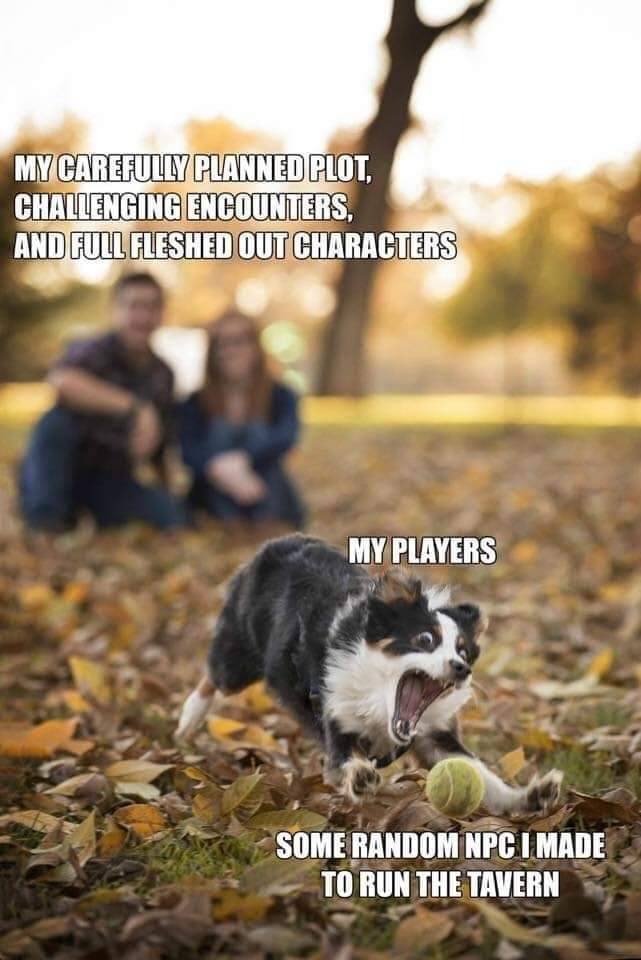Hooking Your Players
This is always tricky. You’ve got a scenario all ready to go. The Catacombs of Malice await! You just have to convince the players to want their characters to enter the scenario.
If you’re in a good place as a GM, your players want to be hooked. They recognize they’re around the table to play an RPG session. They understand the social contract, written or unwritten, that governs your relationship at the gaming table. (There’s a blog post in this concept; I really should write that blog post.) So they’ll be willing to “yes and” where you direct.
You still want them to be motivated beyond “Bob spent a lot of time prepping for this session, so we owe it to him to play along”. You want to provide some impetus they find compelling. The key is to figure out what appeals to your players. What makes them perk up their ears and pay attention. That can be hard to figure out, especially if you play online; body language is as important as words when it comes to communicating attention and intent. Here are my recommendations:
Ask!
The first step is to ask the players what engages them at a personal level. You might not get a straight answer, not because a player is lying to you, but because they simply don’t know. Maybe they’ve never thought about what motivates the character, or thought about it at all. Maybe they’re too new to RPGs to have much idea. But it’s still worth asking!
Most players are somewhere on the spectrum described by the Dungeon Master’s Guide for D&D’s 4th Edition. (Grab a digital copy here; it’s chock full of great advice, and a damn sight better than the useless doorstop the 5E DMG is.) No player is 100% one type of player. Everyone is a mix of, say, Power Gamer and Instigator. And that mix is a moving target. It’s up to you to stay tuned in to what’s appealing to your players during the campaign.
Link!
Use solid personal connections to link the characters to your world. There are two very effective ways to accomplish this: NPCs and Worldbuilding Collaboration.

Crop-dust NPCs of varying types all over the place. They’ll latch on to some of them for what seem like completely stupid reasons. Let them. Use those NPCs to push them in various directions. It doesn’t matter if they latch on to Snerd the goblin tavern waiter instead of Stridagornthorn, the brooding cloaked ranger in the corner. You can still feed the same information, rumors, and hooks. You just have to be more patient and circumspect about it. If Stridagornthorn was going to straight-up send them to the Catacombs of Malice to recover the Chalice of Plonk, Snerd tells them a rumor that Berfman’s having trouble with his pigs, and they discover that the only thing that’ll help his poor pigs is the Chalice of Plonk, hidden in the Catacombs of Malice. They’ve connected with Snerd for some reason that doesn’t really matter. What matters is they’ve connected with him. Roll with it.
Worldbuilding collaboration is great because I’m fundamentally lazy. If you have a player who enjoys creating stuff for their character, let them and fold it into the world! Example: When I start a campaign in a new world, I know the world’s cosmology, but I don’t know everything about every deity and their devotees’ worship practices. I let the cleric’s player do that! At least for their deity. Sometimes some really surprising stuff comes out of that, stuff you can use for several sessions’ worth of adventure.
Another example: Gimli’s player is in character, and tosses an otherwise throwaway line like, “soon, Master Elf, you will enjoy the fabled hospitality of the Dwarves: roaring fire, malt beer, red meat off the bone!” You leap on that. “That sounds awesome! Who’s the leader of that clan-hold? How are you related to him? How well do you know him?” How Gimli’s player answers those questions turns what was a ho-hum long rest in a generic place into a personal connection you can exploit for scenarios later. You don’t have to invent Balin and the history of Moria. You get Gimli’s player to do it for you. That eases your prep and fully immerses Gimli’s player in your world. She’s connected now.
Agency!
Provide players with opportunities to make meaningful choices that impact the game world and the story. Agency is automatic in emergent story in the Old School style, because you don’t start with an established plotline. Everything hinges on what the players decide and the characters do. The world responds to them. Players feel that and that reels them in. It sets up dilemmas which hit them in the guts — if we help this faction it reduces our standing with this other faction we need to accomplish this other goal! We have no good decisions! — and those are, for most tables, the kind of situation the players will talk about years later.
Agency more difficult to manage in a modern “storygame” context, but you can do it. Branching storylines, background trawling, moral dilemmas, and open-ended quests all help. I find those too much to manage, too railroady, and ultimately too boring for my table, but they work.
Anyway, that ought to be enough for you to start with. I have more thoughts on the topic, but they’ll wait for another post. Do you have thoughts? Drop a comment! Or contact us and email it.

